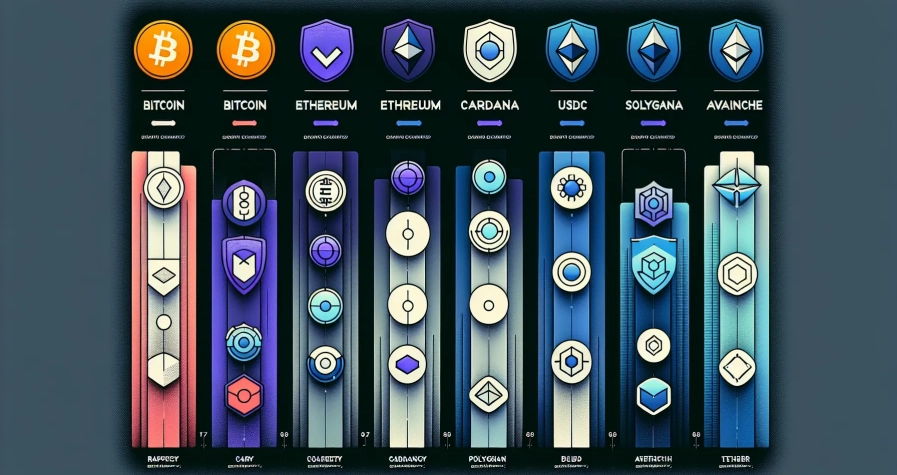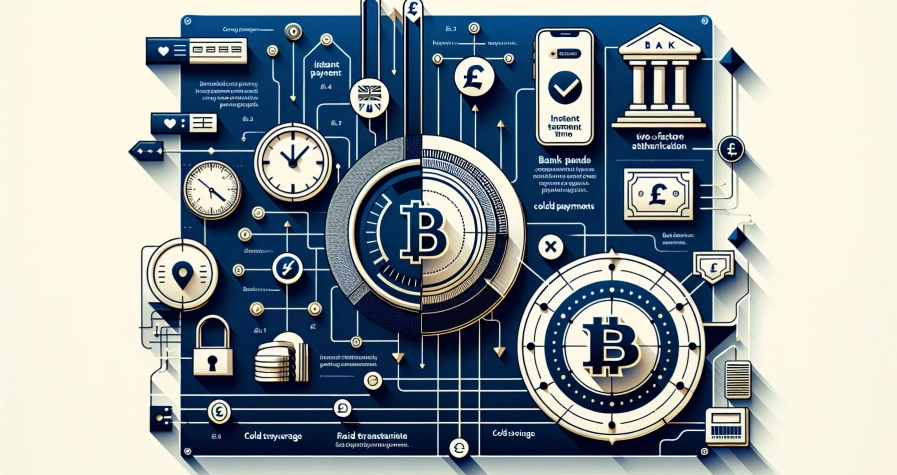The rise of cryptocurrency has transformed online gambling, introducing a new breed of platforms that promise enhanced security, anonymity, and transparency. But are crypto casinos genuinely safe, or do they introduce risks that traditional online casinos don’t face? It’s a valid question, especially given the high stakes involved, both financially and in terms of personal data.
Crypto casinos operate on blockchain technology, leveraging decentralised networks and cryptographic security that sound impressive on paper. Yet, the same features that make them appealing, anonymity, minimal regulation, and borderless transactions, can also expose players to vulnerabilities that aren’t always obvious. From regulatory grey areas to smart contract exploits, the crypto casino landscape is far from straightforward.
This article breaks down what crypto casinos actually are, examines the security mechanisms they employ, and explores the transparency advantages they offer over conventional online casinos. More importantly, it unpacks the genuine risks players face and provides practical guidance on how to identify trustworthy platforms and protect oneself when engaging with crypto gambling sites.
Key Takeaways
- Crypto casinos use blockchain technology and cryptographic encryption to offer enhanced security features that traditional online casinos cannot match.
- Provably fair gaming systems allow players to independently verify each game outcome using cryptographic methods, ensuring transparency in results.
- The lack of consistent regulation creates significant risks, as many crypto casinos operate in legal grey areas without mandatory player protections or dispute resolution mechanisms.
- Anonymity and irreversible cryptocurrency transactions make it difficult to recover funds from fraudulent operators or resolve disputes through traditional channels.
- Always verify licensing credentials, research user reviews, and test platforms with small deposits before committing significant funds to ensure crypto casino safety.
- Implement personal security measures including two-factor authentication, dedicated gambling wallets, and never sharing private keys to protect your cryptocurrency holdings.
What Are Crypto Casinos and How Do They Work?

Crypto casinos are online gambling platforms that accept and operate primarily with cryptocurrencies, think Bitcoin, Ethereum, Litecoin, and a growing list of altcoins. Unlike traditional online casinos that rely on fiat currencies and conventional banking systems, crypto casinos utilise blockchain technology as their operational backbone.
The mechanics are fairly straightforward. Players deposit cryptocurrency from their personal wallets into the casino’s platform, place wagers using those digital assets, and withdraw winnings back to their wallets. The entire process bypasses banks, credit card companies, and payment processors, which means transactions can be faster and often cheaper due to reduced intermediary fees.
Blockchain technology underpins these operations, recording every transaction in an immutable, distributed ledger. This decentralised infrastructure means there’s no single central server holding all the data, instead, transaction records exist across a network of nodes spread globally. It’s this architecture that provides both the security advantages and transparency that crypto casinos promote.
Another defining characteristic is anonymity. Most crypto casinos require minimal personal information to register, sometimes just an email address or even nothing at all. Players can gamble without handing over names, addresses, or financial details, which appeals to those prioritising privacy. But, this same anonymity can be a double-edged sword, as we’ll explore later.
Security Features of Crypto Casinos
Crypto casinos boast several security mechanisms that, in theory, make them more resilient to certain threats than their traditional counterparts. Understanding these features helps clarify where the genuine protections lie, and where they might fall short.
Blockchain Technology and Encryption
At the heart of crypto casino security is blockchain itself. Unlike centralised casino servers, which represent a single point of failure that hackers can target, blockchain distributes data across numerous nodes. Compromising this system would require simultaneously attacking a majority of those nodes, a feat that’s practically unfeasible with established blockchains like Bitcoin or Ethereum.
Player information and transaction details are encrypted using advanced cryptographic methods. Most reputable crypto casinos employ military-grade encryption standards alongside Secure Sockets Layer (SSL) and Transport Layer Security (TLS) protocols. These technologies encrypt communications between players’ browsers and casino servers, preventing interception of sensitive data during transmission.
Public-key cryptography is particularly important here. This system uses two mathematically linked keys: a public key (which anyone can see and use to send you encrypted data) and a private key (which only you possess and use to decrypt that data). When you initiate a transaction, your private key signs it cryptographically, proving authenticity without exposing the key itself. This makes unauthorised access or transaction forgery extremely difficult.
Provably Fair Gaming Systems
Perhaps the most innovative security feature exclusive to crypto casinos is provably fair technology. Traditional online casinos ask players to trust that their random number generators (RNGs) are fair, but verification is typically impossible for the average player. Provably fair systems flip this model entirely.
These algorithms use cryptographic hashing and transparent random number generation that players can independently verify. Before each game round, the casino generates a random server seed and combines it with a client seed (often provided or influenced by the player) and a nonce (a number used once). These inputs are hashed to produce the game outcome.
Crucially, the casino commits to the server seed before the game starts by publishing its hash, a unique cryptographic fingerprint. After the round concludes, the casino reveals the actual server seed, allowing players to verify that it matches the original hash and that the outcome was determined fairly. This process creates an auditable trail that neither party can manipulate after the fact.
Every transaction and game result gets timestamped and recorded on the blockchain, creating easily verifiable digital signatures. It’s transparency in its purest form, anyone can check the maths.
Wallet Security and Private Key Management
Crypto casinos often employ multi-signature wallets to secure funds. These wallets require multiple private keys to authorise a transaction, distributing control and reducing the risk of theft. For instance, a 2-of-3 multi-sig wallet might require any two out of three designated keys to approve a withdrawal, making it harder for a single compromised key to result in loss.
Payment gateways typically comply with Payment Card Industry Data Security Standard (PCI DSS) requirements, using tokenisation and comprehensive risk management procedures. Tokenisation replaces sensitive payment information with unique identification symbols, ensuring actual financial data isn’t stored where it could be breached.
But, there’s a critical caveat: users bear ultimate responsibility for their private keys. If someone gains access to your private key, whether through phishing, malware, or careless storage, they can drain your wallet, and there’s no bank to reverse the transaction. This “be your own bank” philosophy places significant security burden on individual players.
Transparency Advantages Over Traditional Online Casinos
One of the most compelling arguments for crypto casinos is transparency. Blockchain’s inherent openness creates accountability mechanisms that simply don’t exist in traditional online gambling.
Public Transaction Records
Every transaction on a blockchain is permanently recorded and publicly viewable. This isn’t marketing spin, it’s how the technology fundamentally works. Once a transaction is confirmed and added to the blockchain, it becomes part of an immutable historical record that anyone can inspect.
This decentralisation eliminates single points of failure. There’s no central database that could be hacked, altered, or selectively edited to cover up discrepancies. The transaction data exists across thousands of nodes simultaneously, making tampering virtually impossible without detection.
Players can trace deposits, wagers, and withdrawals using blockchain explorers, publicly accessible tools like Etherscan (for Ethereum) or Blockchain.com (for Bitcoin). Simply input a transaction ID or wallet address, and you’ll see the complete transaction history. This level of transparency allows players to verify that their funds arrived where they should, that payouts match advertised amounts, and that the casino’s financial operations are legitimate.
Traditional online casinos, by contrast, operate on closed systems. You must trust that their internal records accurately reflect reality, with limited ability to independently verify their claims.
Verifiable Game Outcomes
Beyond financial transactions, crypto casinos extend transparency to game outcomes themselves. As mentioned earlier, provably fair systems allow players to verify that each game result was determined fairly and wasn’t manipulated after the fact.
This is revolutionary compared to traditional online casinos, where fairness verification is challenging at best. Conventional platforms might publish audit reports from third-party testing agencies, but individual players can’t verify specific game rounds they participated in. You’re essentially trusting the casino and the auditor.
With crypto casinos using provably fair technology, every spin, deal, or roll can be independently verified using publicly available information and simple cryptographic tools. This builds trust through mathematical proof rather than institutional reputation alone. When a casino can demonstrate, rather than merely claim, fairness, it fundamentally changes the player-house relationship.
Key Risks and Vulnerabilities
Even though the technological advantages, crypto casinos come with significant risks that every potential player should understand. Some of these vulnerabilities are inherent to cryptocurrency itself, whilst others stem from the industry’s current state of development.
Regulatory Gaps and Licensing Concerns
This is the elephant in the room, and arguably the most serious risk facing crypto casino players. The cryptocurrency gambling industry operates in a regulatory grey zone that varies dramatically by jurisdiction.
Traditional online casinos in regulated markets must obtain licences from recognised authorities like the UK Gambling Commission, Malta Gaming Authority, or Gibraltar Regulatory Authority. These licences come with stringent requirements: regular audits, fair gaming certifications, responsible gambling measures, segregated player funds, and dispute resolution mechanisms.
Many crypto casinos, but, operate from jurisdictions with minimal or non-existent gambling regulations. Some obtain licences from authorities with questionable standards or enforcement capabilities. Others operate without any licence whatsoever, claiming that cryptocurrency gambling exists in a legal grey area.
This regulatory vacuum creates several problems. Without oversight, there’s limited recourse if disputes arise. If a crypto casino refuses to pay winnings, manipulates games, or simply disappears with player funds, victims often have nowhere to turn. Legal action across international borders is expensive and frequently impractical, especially when the casino’s true operators are difficult to identify.
The lack of regulation also means no mandatory player protections. There are no requirements for responsible gambling tools, self-exclusion programmes, or safeguards for vulnerable players. Fund segregation, keeping player deposits separate from operational funds, isn’t always guaranteed, meaning your balance could vanish if the casino faces financial difficulties.
Smart Contract Exploits and Technical Flaws
Many crypto casinos, particularly those built on platforms like Ethereum, use smart contracts to automate operations. These are self-executing programmes with the terms of the agreement written directly into code. When conditions are met, the contract automatically executes, releasing payouts, adjusting odds, or managing liquidity pools.
The problem? Smart contracts are only as secure as the code they’re written in. Bugs, vulnerabilities, or logical flaws can create exploitable weaknesses. Sophisticated attackers who identify these vulnerabilities can manipulate contracts to drain funds, alter outcomes, or disrupt operations.
Several high-profile decentralised finance (DeFi) platforms have suffered massive losses due to smart contract exploits, sometimes losing millions in minutes. Whilst crypto casinos aren’t always as complex as DeFi protocols, they face similar risks. Once a smart contract is deployed on the blockchain, it’s often difficult or impossible to modify, meaning vulnerabilities can persist even after discovery.
Unlike traditional casinos where server-side code can be patched quickly, blockchain’s immutability becomes a liability when flawed code is already live. Some platforms carry out upgradeable contracts or multi-sig controls to mitigate this, but these solutions introduce their own complexity and potential vulnerabilities.
Anonymity and Potential for Fraud
The same anonymity that attracts privacy-conscious players also provides cover for fraudulent operators. Unscrupulous individuals can launch crypto casinos with minimal personal exposure, market them aggressively, collect deposits, and then vanish without legal consequences.
Tracking cryptocurrency transactions is possible, but connecting those transactions to real-world identities is considerably harder, especially when operators use mixers, privacy coins, or layered wallets. This makes accountability difficult and gives bad actors confidence they won’t face prosecution.
Also, the irreversible nature of cryptocurrency transactions means there’s no chargeback mechanism. If you deposit funds to a fraudulent casino, there’s no payment processor to appeal to, no bank to reverse the transaction. Once cryptocurrency leaves your wallet, it’s gone unless the recipient voluntarily returns it.
Phishing sites and fake casinos are another concern. Scammers create convincing replicas of legitimate crypto casinos, tricking players into depositing funds or revealing private keys. Without centralised authorities vetting and removing fraudulent sites, players must be exceptionally vigilant.
How to Identify a Safe Crypto Casino
Given the risks, due diligence isn’t optional, it’s essential. Identifying trustworthy crypto casinos requires examining several key indicators that separate legitimate operations from potential scams.
Licensing and Regulatory Compliance
Start by verifying whether the casino holds a legitimate gambling licence from a recognised authority. Whilst crypto casinos sometimes operate in jurisdictions with lighter regulation than traditional online casinos, reputable platforms still seek licensing from established bodies.
Look for licences from authorities such as Curaçao eGaming, Malta Gaming Authority, or the UK Gambling Commission. These aren’t perfect, Curaçao, for instance, is often criticised for lax enforcement, but they provide baseline standards and dispute resolution mechanisms.
Check the casino’s website footer or “About Us” section for licence information, then verify it directly with the issuing authority. Legitimate licences include verifiable registration numbers that you can cross-reference on the regulator’s official website. If a casino claims to be licensed but won’t provide verifiable details, that’s a red flag.
Also, consider the casino’s operational transparency. Does it clearly state who operates the platform? Is there contact information beyond a generic email address? Legitimate operations typically provide company registration details, physical addresses, and multiple communication channels.
User Reviews and Reputation Indicators
Reputation matters enormously in an industry where regulatory protection is limited. Research independent reviews from multiple sources, dedicated gambling forums, Reddit communities, Trustpilot, and specialised crypto casino review sites.
Look for patterns in feedback. Occasional complaints are normal for any gambling platform, but consistent reports of withheld withdrawals, manipulated games, or unresponsive customer service indicate serious problems. Pay particular attention to how the casino responds to criticism, do they address concerns transparently, or ignore complaints?
Established platforms with years of operation and consistent positive feedback are generally safer bets than brand-new casinos with no track record. Whilst every platform was new once, starting with established names reduces risk significantly.
Verify that transactions are actually recorded on the blockchain as claimed. Use blockchain explorers to check whether the casino’s published wallet addresses show the transaction volume they advertise. If a platform claims transparency but you can’t verify its on-chain activity, something’s amiss.
Check whether the casino uses provably fair technology and, crucially, whether it actually works. Some platforms advertise provably fair gaming but carry out it poorly or make verification unnecessarily complicated. Test the verification process with small wagers before committing significant funds.
Best Practices for Staying Safe
Beyond choosing reputable platforms, players should adopt security practices that minimise personal risk when engaging with crypto casinos.
Use only established crypto casinos with verifiable blockchain transaction histories. New platforms might be legitimate, but they haven’t proven themselves yet. Stick with casinos that have operated transparently for at least a year and have substantial, verifiable on-chain activity.
Enable two-factor authentication (2FA) on all accounts. Most crypto casinos offer 2FA through apps like Google Authenticator or Authy. This adds a crucial second layer of security, even if someone obtains your password, they can’t access your account without the time-based code from your device.
Never share private keys or seed phrases. Legitimate casinos will never ask for these. Your private key is equivalent to the key to your safe, anyone who has it can take everything. Store seed phrases offline, preferably in multiple secure physical locations, never in cloud storage or email.
Verify provably fair credentials before depositing funds. Test the verification process with the casino’s demo games or minimal wagers. Ensure you understand how to check game outcomes independently. If the process seems opaque or the casino can’t clearly explain it, reconsider using the platform.
Start with small amounts to test platform reliability. Make a modest deposit, place some wagers, and attempt a withdrawal. Observe how smoothly the process works, how quickly the casino processes payments, and whether customer service is responsive if issues arise. Only after successfully testing the platform should you consider larger deposits.
Research the jurisdiction and regulatory status before engaging. Understand where the casino is legally based, what protections (if any) you have as a player, and whether gambling with crypto is legal in your own jurisdiction. Legal ambiguity can create complications beyond just the platform’s trustworthiness.
Use dedicated wallets for gambling. Don’t connect wallets containing significant holdings or long-term investments to gambling platforms. Create a separate wallet specifically for casino activities, transferring only what you’re willing to wager. This limits exposure if the platform is compromised or if you accidentally interact with a malicious contract.
Keep software updated. Whether you’re using browser extensions like MetaMask or standalone wallet applications, ensure they’re running the latest versions with current security patches. Outdated software can contain known vulnerabilities that attackers exploit.
Be wary of offers that seem too good to be true. Astronomical bonuses, guaranteed returns, or “insider” betting systems are classic red flags. Legitimate casinos operate on mathematical house edges and can’t offer risk-free returns. Scammers use unrealistic promises to lure victims.
Conclusion
So, are crypto casinos safe? The answer is nuanced. The underlying blockchain technology provides genuine security advantages, decentralised architecture, cryptographic encryption, and transparent transaction records create protections that traditional centralised systems can’t match. Provably fair gaming represents a legitimate innovation, offering verifiable fairness that conventional online casinos simply cannot provide.
But, technology alone doesn’t guarantee safety. The crypto casino industry’s regulatory gaps remain its Achilles heel. Without consistent oversight, standardised licensing requirements, and enforceable player protections, the space remains vulnerable to fraudulent operators and unethical practices. The irreversible nature of cryptocurrency transactions and the difficulty of cross-border legal recourse amplify these risks considerably.
For players, this means crypto casinos can be safe, but only with careful selection and diligent security practices. Prioritising licensed platforms with established reputations, verifiable on-chain activity, and transparent operations dramatically reduces risk. Combining platform due diligence with personal security measures, 2FA, private key protection, dedicated gambling wallets, and cautious fund management, creates a reasonable safety framework.
The crypto casino landscape will likely mature as regulatory frameworks develop and industry standards emerge. Until then, players must be their own first line of defence, approaching these platforms with both appreciation for their technological innovations and realistic awareness of their current limitations. Blockchain provides the tools for enhanced security and transparency, but eventually, it’s how those tools are implemented, and how carefully players choose their platforms, that determines actual safety.
Frequently Asked Questions
Are crypto casinos safe to use compared to traditional online casinos?
Crypto casinos can be safe if they’re properly licensed and employ blockchain security measures like encryption and provably fair technology. However, regulatory gaps and anonymity features introduce unique risks not found in traditional casinos, making careful platform selection essential for player safety.
What is provably fair gaming in crypto casinos?
Provably fair gaming uses cryptographic hashing to allow players to independently verify that game outcomes weren’t manipulated. The casino commits to a server seed before each round, which players can later verify against the published hash, ensuring mathematical transparency and fairness.
How can I identify a trustworthy crypto casino?
Look for verifiable gambling licences from recognised authorities, check independent user reviews across multiple platforms, verify blockchain transaction histories using explorers, test provably fair systems with small wagers, and ensure the platform provides transparent company and contact information before depositing.
What are the main risks of using crypto casinos?
Key risks include operating in regulatory grey areas with limited legal recourse, smart contract vulnerabilities that can be exploited, irreversible cryptocurrency transactions with no chargeback protection, and anonymity features that enable fraudulent operators to launch scam platforms with minimal accountability.
Can I remain anonymous when gambling at crypto casinos?
Yes, most crypto casinos require minimal personal information, sometimes just an email address. Players can deposit and withdraw cryptocurrency without providing names, addresses, or financial details. However, this anonymity also benefits fraudulent operators, making it harder to pursue legal action if disputes arise.
What happens if I lose my private key for a crypto casino wallet?
If you lose your private key or seed phrase, you permanently lose access to your cryptocurrency, as there’s no central authority to recover it. Unlike traditional banks, crypto operates on a ‘be your own bank’ model, placing complete security responsibility on users.








